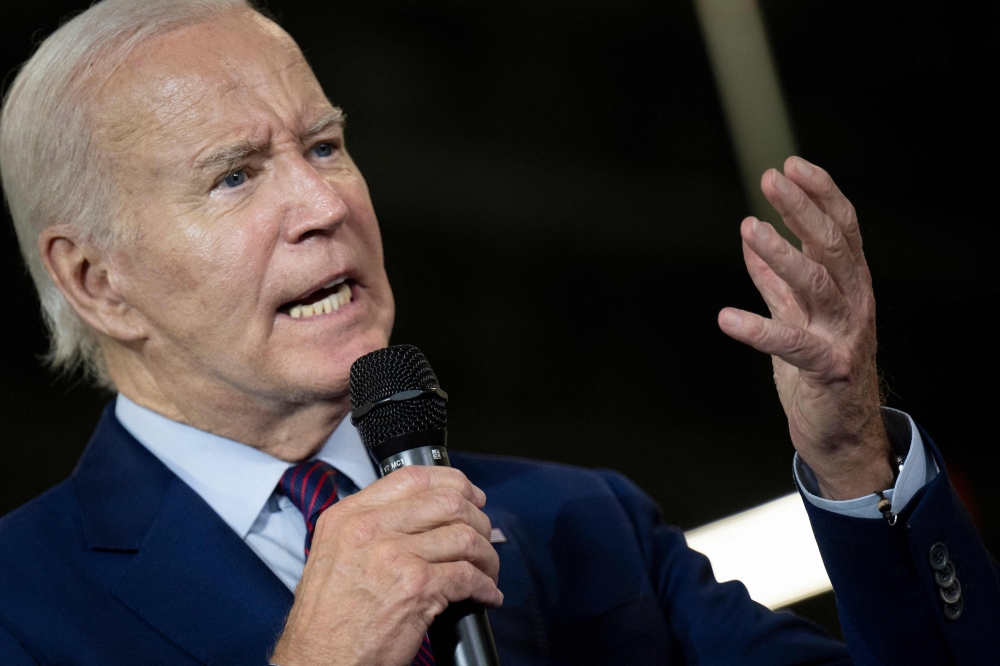

For the hundreds of thousands of Israeli democracy defenders who tried to block Prime Minister Benjamin Netanyahu’s judicial coup on Monday, the stripping of the Israeli Supreme Court’s key powers to curb the executive branch surely feels like a stinging defeat. I get it, but don’t totally despair. Help may be on the way from talks between the United States and Saudi Arabia.
Yes, you read that right.
When I interviewed President Joe Biden in the Oval Office recently, my column focused on his urging Netanyahu not to ram through the judicial overhaul without even a semblance of national consensus. But that’s not all we talked about. The president is wrestling with whether to pursue the possibility of a US-Saudi mutual security pact that would involve Saudi Arabia normalising relations with Israel, provided that Israel make concessions to the Palestinians that would preserve the possibility of a two-state solution.
After discussions in the past few days among Biden; his national security adviser, Jake Sullivan; Secretary of State Antony Blinken; and Brett McGurk, the top White House official handling Middle East policy, Biden has dispatched Sullivan and McGurk to Saudi Arabia, where they arrived on Thursday morning, to explore the possibility of some kind of US-Saudi-Israeli-Palestinian understanding.
The president still has not made up his mind whether to proceed, but he gave a green light for his team to probe with Crown Prince Mohammed bin Salman of Saudi Arabia to see if some kind of deal is possible and at what price. Closing such a multinational deal would be time-consuming, difficult and complex, even if Biden decides to take it to the next level right away. But the exploratory talks are moving ahead now — faster than I thought — and they’re important for two reasons.
First, a US-Saudi security pact that produces normalisation of relations between Saudi Arabia and the Jewish state — while curtailing Saudi-China relations — would be a game changer for the Middle East, bigger than the Camp David peace treaty between Egypt and Israel. Because peace between Israel and Saudi Arabia, the custodian of Islam’s two holiest cities, Mecca and Medina, would open the way for peace between Israel and the whole Muslim world, including giant countries like Indonesia and maybe even Pakistan. It would be a significant Biden foreign policy legacy.
Second, if the US forges a security alliance with Saudi Arabia — on the conditions that it normalise relations with Israel and that Israel makes meaningful concessions to the Palestinians — Netanyahu’s ruling coalition of Jewish supremacists and religious extremists would have to answer this question: You can annex the West Bank, or you can have peace with Saudi Arabia and the whole Muslim world, but you can’t have both, so which will it be?
The Saudis are seeking three main things from Washington: a Nato-level mutual security treaty that would enjoin the US to come to Saudi Arabia’s defence if it is attacked (most likely by Iran); a civilian nuclear programme, monitored by the US; and the ability to purchase more advanced US weapons, like the Terminal High Altitude Area Defence anti-ballistic missile defence system, which are particularly helpful to the Saudis against Iran’s growing mid- and long-range missile arsenal.
Among the things the US wants from the Saudis are an end to the fighting in Yemen, where the conflict has blessedly been diminishing over the past year; an unprecedentedly large Saudi aid package to Palestinian institutions in the West Bank; and significant limits on the growing relationship between Saudi Arabia and China.
Just as important, though, is what the Saudis would demand of Israel to preserve the prospect of a two-state solution — the way the United Arab Emirates demanded that Netanyahu forgo any annexation of the West Bank as a price for their Abraham Accords.
The Saudi leadership is not particularly interested in the Palestinians or knowledgeable about the intricacies of the peace process.
But if the Biden team made a deal without a significant Palestinian component, it would simultaneously strike a death blow to the Israeli democracy movement — by giving Netanyahu a huge geopolitical prize for free after he just did something so antidemocratic — and to the two-state solution, the cornerstone of US-Middle East diplomacy.
I don’t believe Biden will do that. It would spark a rebellion in the progressive base of his party and make ratification of the deal well-nigh impossible.
I believe that, at a minimum, the Saudis and Americans could (and should) demand four things from Netanyahu for such a huge prize as normalisation and trade with the most important Arab Muslim state:
— An official promise not to annex the West Bank — ever.
— No new West Bank settlements or expansion outward of existing settlements.
— No legalisation of wildcat Jewish settlement outposts.
— And transferring some Palestinian-populated territory from Area C in the West Bank (now under full Israeli control) to Areas A and B (under Palestinian Authority control) — as provided for in the Oslo Accords.
In return, the Palestinian Authority would have to endorse Saudi Arabia’s peace deal with Israel.
Truth be told, the Palestinian Authority is in no position to engage in peace talks with Israel today. It’s a mess. The Palestinians need to remake their government, but in the meantime, the far-right ministers in Israel’s Cabinet are trying to absorb as much of the West Bank as fast as they can. The urgent need is to stop that immediately — but not with another dose of finger-wagging from the State Department about how “deeply troubled” the US is about Israeli settlements. Rather, the best move is a big strategic initiative that has something significant for everyone, except the zealots on all sides. — The New York Times
Oman Observer is now on the WhatsApp channel. Click here



